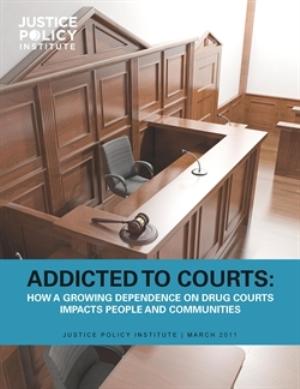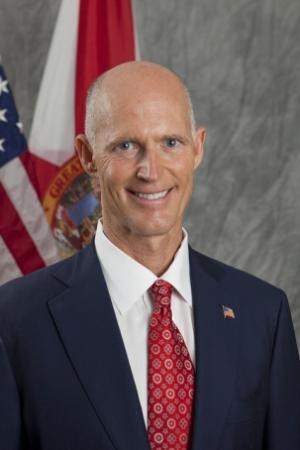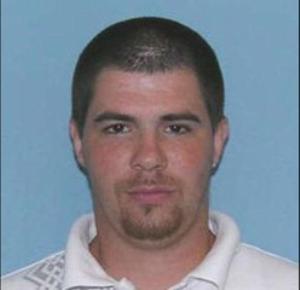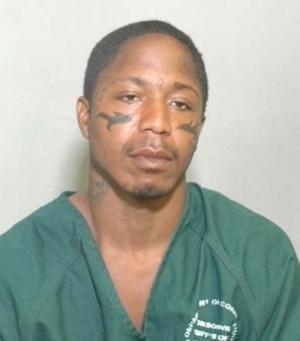New new reports take a hard look at drug courts and suggest more effective alternatives.
Dr. Marion "Mollie" Fry and her partner, Dale Schafer, are about to go to federal prison for five years for medical marijuana.
Bills that would allow state-licensed medical marijuana dispensaries are moving in Washington, which already has a medical marijuana law, and Delaware, which doesn't.
MedicalMarijuana.ProCon.org, part of the ProCon.org family, is an in-depth web site presenting information and views from a variety of perspectives on the medical marijuana issue. The Chronicle is running a six-part series of info items from ProCon.org, and we encourage you to check it out.
The perennial legislative impulse to drug test people receiving public benefits has petered out this year in Little Rock.
Florida's new Republican governor wants to make state employees pee in a cup to keep their jobs. The state ACLU reminds him that that's a constitutional no-no.
The US ambassador to Mexico resigns over Wikileaks, Mexico acknowledges allowing unmanned US surveillance drones over Mexico, a prominent trafficker is killed, a well-known musician is wounded. And of course, the threats and the carnage that have become usual since Calderon intensified the Mexican drug war continue unabated.
Jail guards, probation officers, narcs, deputies, DARE officers, ICE agents -- it's corrupt cops gone wild this week!
A South Carolina drug task force's effort to apprehend a fugitive instead resulted in a shootout leaving a deputy wounded and the suspect dead.
Jacksonville undercover narcotics officers serving drug and fugitive warrants shot and killed the suspect after he displayed a weapon.
It's only mid-March, but 19 people, including two law enforcement officers, have already died in drug enforcement-related incidents this year. The latest deaths came last Wednesday in Houston and Tulsa.
Events and quotes of note from this week's drug policy events of years past.
With a pair of separate reports released Tuesday, the Drug Policy Alliance (DPA) and the Justice Policy Institute (JPI) have issued a damning indictment of drug courts as a policy response to drug use. Instead of relying on criminal justice approaches like drug courts, policymakers would be better served by moving toward evidence-based public health approaches, including harm reduction and drug treatment, as well as by decriminalizing drug use, the reports conclude.

Since then-Dade County District Attorney Janet Reno created the first drug court in Miami in 1989, drug courts have appeared all over the country and now number around 2,000. In drug courts, drug offenders are given the option of avoiding prison by instead pleading guilty and being put under the scrutiny of the drug court judge. Drug courts enforce abstinence by imposing sanctions on offenders who relapse, including jail or prison time and being thrown out of the program and imprisoned on the original charge. The Obama administration wants to provide $57 million in federal funding for them in its FY 2012 budget.
Through organizations like the
National Association of Drug Court Professionals (NADCP), the drug court movement has created a well-oiled public relations machine to justify its existence and expansion. NADCP maintains that the science shows that
drug courts work and even maintains a convenient
response to criticisms leveled by earlier critics.
The Chronicle contacted NADCP for comment this week, but representatives of the group said they were still digesting the reports and would issue a statement in a few days.
But in a Monday teleconference, DPA, JPI, and the
National Association of Criminal Defense Lawyers (NACDL), which issued its own critical report on
America's Problem-Solving Courts in 2009, slashed away at drug court claims of efficacy and scientific support. Drug courts are harsh on true addicts, don't benefit the public health or safety, and are an inefficient use of criminal justice system resources, they said.
"The drug court phenomenon is, in large part, a case of good intentions being mistaken for a good idea," said Margaret Dooley-Sammuli, DPA's Southern California state deputy director and co-author of the DPA report,
Drug Courts are Not the Answer: Toward a Health-Centered Approach to Drug Use. "Drug courts have helped many people, but they have also failed many others, focused resources on people who could be better treated outside the criminal justice system and in some cases even led to increased incarceration. As long as they focus on people whose only crime is their health condition, drug courts will be part of the problem -- not the solution -- created by drug war policies," she said.
"Even if drug courts were able to take in all 1.4 million people arrested for just drug possession each year, over 500,000 to 1 million people would be kicked out and sentenced conventionally," Dooley-Sammuli added. "Drug courts just don't make sense as a response to low-level drug violations."
The DPA report found that drug courts have not demonstrated cost savings, reduced incarceration, or improved public safety. Previous "unscientific and poorly designed research" supporting drug courts has failed to acknowledge that drug courts often "cherry pick" people expected to do well, that many petty drug law violators choose drug courts because they are offered a choice of treatment or jail and drug courts thus are not diverting large numbers of people from long prison sentences, or that, given their focus on low-level drug violators, even positive results for individuals accrue few public safety benefits for the community.
Not only are drug courts' successes unproven, DPA said, they are often worse for the people participating in them. Their quick resort to incarceration for relapses means some defendants end up serving more time than if they had stayed out of drug court. And defendants who "fail" in drug court may face longer sentences because they lost the opportunity to plead to a lesser charge. In addition, the existence of drug courts is associated with increased arrests and imprisonment because law enforcement and others believe people will "get help" if arrested.
Worst, the DPA report found, drug courts are toughest on those who most need treatment for their addictions. Because of their use of quick sanctions against those who relapse, the seriously addicted are more likely to end up incarcerated for failing to stay clean, while those who don't have a drug problem are most likely to succeed. Drug courts typically don't allow what Dooley-Sammuli called the "gold standard" of treatment for opiate addiction, methadone or other maintenance therapies.
Drug courts should be reserved for cases involving offenses against persons and property committed by people who have substance abuse problems, while providing other options such as probation or treatment for people arrested for low-level drug law violations, the report recommended. It also called for bolstering public health systems, including harm reduction and drug treatment programs, to deal with drug use outside the criminal justice system, and for decriminalizing drug use to end the problem of mass arrests and incarceration.
"Drug courts are not a true alternative to incarceration," said Natassia Walsh, author of the JPI report,
Addicted to Courts: How a Growing Dependency on Drug Courts Impacts People and Communities. "They are widening the net of criminal justice control. Even the mere existence of a drug court means more people are arrested for drug offenses, which brings more people into the criminal justice system, which means increased costs for states and localities, as well as for offenders and their families."
The JPI report found that providing people with alternatives like community-based drug treatment are more cost-effective and have more public safety benefits than treatment attached to the criminal justice system, with all its collateral consequences.
"It is shameful that for many people, involvement in the criminal justice system is the only way to access substance abuse treatment in this country," said Walsh. "We need to change the way we think about drug use and the drug policies that bring so many people into the justice system. The dramatic increase in drug courts over the past 20 years may provide talking points for so-called 'tough-on-crime' policymakers; however, there are other, better options that can save money and support people and communities. More effective, community-based programs and services that can have a positive, lasting impact on individuals, families and communities should be available."
"All three of our reports have some things in common, " said the NACDL's Elizabeth Kelly. "They recognize that substance abuse is a public health issue not appropriate for the criminal justice system to handle, they recognize that these problem-solving courts cherry pick their participants, allowing them to inflate success rates, and they recognize that drug courts exclude the people who are most problematic and who have the most profound addictions," she said.
"It is fundamentally bad public policy to make the only means to treatment through the criminal justice system that stigmatizes and burdens the individual with all the collateral consequences of a criminal conviction," Kelly concluded.
The fight to avoid the drug policy dead end that is drug courts is on.
back to top
Special to the Chronicle by Sharon Letts
After more than six years of litigation, and three years of appeals for manufacturing and conspiracy to manufacture and distribute cannabis, Dr. Marion "Mollie" Fry and her husband of 25 years, civil attorney Dale Schafer, attended a hearing at the US courthouse in Sacramento Monday week, in which their bonds were revoked and they were given a the date of May 2 to surrender to serve five-year federal prison terms.

Dr. Marion Fry with longtime partner, attorney, Dale Schafer at their home near Sacramento. (Photo by Sharon Letts)
Fry and Schafer's prior home located in the hills just north of Sacramento was raided in 2001, with 34 plants confiscated - what they believed to be well below the 99 plant limit set forth by local ordinances.
According to Schafer, the couple had never grown more than 44 plants in a given year. A little known fact, he explained, is that under federal law more than 100 plants grown in a five year period, accumulatively, is cause for the mandatory five-year sentence, overriding state laws.
Dr. Fry, who had gone through a radical mastectomy just three years prior, had made the decision to grow her own medicine, medicating through her illness, surgery and continued to medicate from myriad complications from chemotherapy until the arrest. Schafer suffers from hemophilia and failed back syndrome, is under constant care, and had also medicated with cannabis legally.
According to Fry and Schafer, prior to the arrest they had conferred numerous times with local officials, state Attorney General Bill Lockyer, and El Dorado County Sheriff's Detectives Timothy McNulty and Robert Ashworth, regarding the legality of their cannabis production for their own use and for Fry’s patients.
"We weren't selling the medical cannabis to my patients," Fry said. "We had staff and were charging $10 for delivery only, and that's a common practice today."
Ultimately it was staff, Schafer said, who broke rules, and ultimately they were responsible for all actions.
"We fired anyone who wasn't following the code of the law," Schafer said. "One week before we were raided, two undercover federal agents attended a workshop for 215 cardholders we were holding at the local Grange Hall. The chef teaching the class allowed patients to go home with some of the edibles made, including the agents."
Fry said comments were made during the class that may have been misunderstood by the agents, saying it was a comedy of errors with a not so amusing ending.
"The judge wouldn’t allow any medical evidence. They wouldn't let us tell the jury I was sick, or that I was a doctor," Fry said. "They wouldn’t allow that I was helping sick patients. Ironically, two years before the raid, local authorities asked me to tell them who of my patients were 'really' sick, and who wasn't." I told them it wasn't my job to police my patients, and that everyone who came to me had legitimate health issues. They have treated us like criminals."

Dr. Marion Fry believes that cannabis is good medicine, and that God will save her. (Photo by Sharon Letts)
Fry's lineage includes seven generations of doctors. Family notables include her grandfather, Dr. Francis Marion Pottenger, celebrated for being at the forefront of curing tuberculosis in the early 1900s, and founding the field of internal medicine in the process.
Her grandmother studied under Carl Jung in the 1950s, founding a Jungian institute in Houston in the 1960s, while her mother also became a physician in the 1950s.
"When I was young my mother told me I could do whatever I choose to do with my life. She told me the United States of America is a free country," Fry explained. "But, I was outspoken on this topic."
Lack of education on the topic of medicinal cannabis, Fry and Schafer agree, is the true culprit in their court case, and the couple chose activism to further the cause, something that may have contributed to their demise.
"When I was in the thick of helping people, I knew it was the right thing to do," she said. "Cannabis helped me immensely when I was going through cancer."
After ten years of defending themselves the couple has more questions than answers.
"Cannabis is proven medicine. Why would the state of California create laws based on what the people want, and then allow the federal Government to override them?" Fry asks. "I had cancer, we were growing medicine. I was helping people."
Dr. Fry's license to practice has been revoked for some time now, as has her husband's license to practice law. The couple's grown children with grandkids have moved back home to help with financs and save the family home. A Pay Pal account has been set up for donations. It can be accessed
here. "Cool Madness," a book written about the trial by author Vanessa Williams is available
online through StoptheDrugWar.org (publisher of this web site), Amazon.com or other online booksellers, or directly at the
"Cool Madness" web site. Donations and correspondence of support can also be sent to the family, P.O. Box 634, Cool, CA 95614.
back to top
Medical marijuana bills advanced on both coasts this week. In Washington state, a bill already approved by the Senate passed out of committee Wednesday and is headed to a floor vote in the House, while in Delaware, a bill passed out of committee the same day and is headed for a floor vote in the Senate.

From Dover to Olympia, medical marijuana is on the move. (Image via Wikimedia.org)
In Washington, a now heavily amended
Senate Bill 5073 passed out of the House Health Care Committee on a tight 6-5 vote. Washington already has a medical marijuana law, but this bill would create a regulatory framework for a system of state-licensed dispensaries. Dispensaries are already operating in the state without formal legal approval, and one dispensary operator was recently convicted of state marijuana trafficking offenses in Spokane.
But the bill, if passed, won't necessarily ensure an in for existing dispensaries. Instead, it allows the state Health Department to determine the number of dispensaries to operate in each county and sets up a lottery for licenses. Existing dispensaries are not grandfathered in. Dispensaries would no longer have to be nonprofit, as the bill originally envisaged.
Patients could voluntarily register with the state and be protected from prosecution if they possessed up to 15 plants and 24 ounces of medical marijuana. Caregivers could also register with the same protections. Patients who do not register, but do possess a letter from a physician could use medical need as part of an affirmative defense.
Patients and caregivers could also band together in grow collectives of up to 10 patients and 150 plants.
On the other side of the country, Delaware's
Senate Bill 17 passed out of the Senate Health and Human Services Committee Wednesday afternoon on a unanimous vote. The bill would create a system of three nonprofit medical marijuana dispensaries, one for each county, to be regulated by the Department of Health and Human Services.
It would allow patients with approved qualifying conditions and a written recommendation from a physician to obtain a patient ID card from the department, which would protect the patient from arrest if he or she is in compliance with the law.
Patients would be allowed to possess up to six ounces of marijuana, while registered caregivers could possess that amount for up to five patients. The law does not, however, appear to explicitly allow patients or their caregivers to grow their own plants.
The bill now heads for a Senate floor vote, possibly on March 31. If it passes, it then goes on to the House.
Fifteen states and the District of Columbia have already approved medical marijuana law. Bills are moving in other states this year, including Connecticut, Hawaii, Illinois, and New Hampshire.
back to top
Did you know there were 71 peer-reviewed medical studies involving cannabis and cannabis extracts between 1990 and 2010? Read the details at 71 Peer-Reviewed Studies on Marijuana, on the web site medicalmarijuana.procon.org, part of the ProCon.org family.
Follow Drug War Chronicle for more important facts from ProCon.org over the next several weeks, or sign up for ProCon.org's email list or RSS feed. Read last week's ProCon.org blurb here.
ProCon.org is a web site promoting critical thinking, education, and informed citizenship by presenting controversial issues in a straightforward, nonpartisan primarily pro-con format.

back to top
An Arkansas bill that would have required recipients of unemployment benefits to undergo random drug tests has been stopped in the state Senate. The Senate Health, Welfare and Labor Committee killed Senate Bill 157 in a Monday vote.

Common sense at the statehouse in Little Rock (Image via Wikimedia.org)
The bill's sponsor, Sen. Bill Pritchard (R-Elkins), told the committee he had received numerous calls in favor of the bill and that some callers wanted even stiffer anti-drug laws for those receiving unemployment benefits. Under the bill, recipients would be randomly tested for methamphetamine, cocaine, and heroin, with 10% of them being tested at the third and 13
th weeks of benefits.
"As soon as they get help and they can pass the test, they can get right back on benefits," he said.
But the bill drew opposition from both the Arkansas chapter of the ACLU, whose Holly Dickson testified, and the Arkansas AFL-CIO, which was represented by its president, Alan Hughes.
Committee Chairman Sen. Percy Malone (D-Arkadelphia) sided with opponents. Families would be hurt if jobless benefits were cut, he said.
The bill then failed on a voice vote.
Bills aimed at drug testing people applying for or receiving government benefits are a perennial in state legislatures, with similar legislation being introduced in more than a dozen states. But they rarely go far because of constitutional problems with suspicionless drug testing, concerns over the cost of drug testing, and concerns that such policies would be counterproductive by hurting the families of those whose benefits would be stopped.
back to top
Florida Gov. Rick Scott (R) Tuesday issued an executive order Tuesday requiring that current state employees submit to random drug tests and that applicants for state jobs undergo pre-hiring drug tests. The order will go into effect in 60 days for current employees and immediately for new hires, but it certain to be challenged in court.

Rick Scott
The executive order came as the state legislature grapples with a bill that would require people who apply for state welfare benefits to submit to a drug test -- and pay for it themselves -- before receiving them. That bill,
Senate Bill 556, is supported by Gov. Scott and passed the Senate Criminal Justice Committee Tuesday.
"Floridians deserve to know that those in public service, whose salaries are paid with taxpayer dollars, are part of a drug-free workplace," Scott said. "Just as it is appropriate to screen those seeking taxpayer assistance, it is also appropriate to screen government employees."
The bill applies only to workers in executive agencies that answer to the governor. Legislators and their staffs would be exempt.
State law already allows for, but does not require, pre-employment drug testing of applicants for jobs at state agencies under the Florida Drug-Free Workplace Act. But the random drug testing of both state employees and welfare recipients is likely to run up against the US Constitution.
Federal courts have generally found that random testing of government workers who aren't in jobs that affect public safety amounts to a "search" by the government. Such searches must be "reasonable," generally, and some courts have interpreted such requirements of ordinary government workers as a violation of the US Constitution's Fourth Amendment right against unreasonable searches. A Michigan law requiring drug testing of welfare recipients was thrown out by the federal courts in 2003.
The ACLU of Florida attacked Scott's order, saying that a federal court had in 2004 already ruled that the state was violating the Fourth Amendment when the Department of Juvenile Justice instituted a random drug testing program. In that case, a US district judge ordered the agency to halt random drug testing and pay the worker who sued $150,000.
"I'm not sure why Gov. Scott does not know that the policy he recreated by executive order today has already been declared unconstitutional," ACLU of Florida Executive Director Howard Simon said in a statement. "The state of Florida cannot force people to surrender their constitutional rights in order to work for the state. Absent any evidence of illegal drug use, or assigned a safety-sensitive job, people have a right to be left alone."
While Gov. Scott is coming off as a hard-liner when it comes to drug testing poor people and state workers, he has also zeroed out the state drug czar's office and blocked the state from beginning a prescription drug tracking plan. But then, as the saying goes, consistency is the hobgoblin of small minds.
back to top
by Bernd Debusmann, Jr.
Mexican drug trafficking organizations make billions each year smuggling drugs into the United States, profiting enormously from the prohibitionist drug policies of the US government. Since Mexican president Felipe Calderon took office in December 2006 and called the armed forces into the fight against the so-called cartels, prohibition-related violence has killed more than 36,000 people, including more than 15,000 last year. The increasing militarization of the drug war and the arrest of dozens of high-profile drug traffickers have failed to stem the flow of drugs -- or the violence -- whatsoever. The Merida initiative, which provides $1.4 billion over three years for the US to assist the Mexican government with training, equipment and intelligence, has so far failed to make a difference. Here are a few of the latest developments in Mexico's drug war:
Wednesday, March 16
In Mexico City,
Mexican officials confirmed that American surveillance drones have been operating over Mexico. According to American officials, intelligence that was obtained using the drones has led to the arrest of several suspects in the February 15 killing of an American ICE agent in San Luis Potosi.
Thursday, March 17
In Ciudad Juarez,
an American citizen was shot and killed. Jose Reyes Castro, 26, was at a family gathering when it was attacked by gunmen. The motive is unclear.
Friday, March 18
In Culiacan, Sinaloa,
well-known trafficker Onorio Felix Gutierrez, 22, was killed when his car was ambushed by a group of heavily armed men. Felix Gutierrez was married to the daughter of Manuel Torres Felix "M1," a high-ranking member of the Sinaloa Cartel.
In Monterrey,
six gunmen were killed during a fire fight with police. The clash began when state police units tried to stop a suspicious SUV, which opened fire on them. Two officers were wounded.
Saturday, March 19
In Mexico City,
US Ambassador Carlos Pascual resigned from his diplomatic post. The resignation comes after a public spat with the Mexican government over the content of Wikileaks diplomatic cables in which Pascual was critical of the Mexican government for its lack of cooperation in the war on drugs.
In Acapulco,
ten people were shot dead by heavily armed gunmen in a nightclub. Four others were wounded in the incident. All the victims were males between the ages of 25 and 45. The motive for the attack remains unknown.
Near Mazatlan,
gunmen attacked the small village of Los Limones. Several truckloads of gunmen arrived and searched for at least three men. Four homes were fired upon and burned to the ground. No injuries were reported.
Sunday, March 20
In Ciudad Juarez,
a warning to state police was found painted on a wall. The message is signed by La Linea, the enforcement arm of the Juarez Cartel led by Vicente Carrillo Fuentes. The message warns a police commander that if he does resign, La Linea will begin killing one police officer a day. Earlier in the day, the same officer survived an attempt on his life, in which one of his bodyguards was shot and killed. The sign also accused him of supporting the Sinaloa Cartel.
In Caderyeta, Nuevo Leon, the
dismembered body of a man in his 30s was found inside a minivan, which was found otherwise abandoned in a drainage ditch. Notes threatening rival cartels were left at the scene, but police did not release the contents.
Monday, March 21
In Phoenix,
three Mexican nationals were indicted for allegedly attempting to purchase sophisticated weapons systems for the Sinaloa Cartel. Among the weapons the three were attempting to purchase were a Stinger anti-aircraft missile and three different types of anti-tank rockets. The defendants were arrested about a year ago; the indictment is just being unsealed.
In Colima,
a well-known corrido musician was wounded during an assassination attempt. Twenty-year old Gerardo Ortiz was leaving a concert with his entourage when his SUV was attacked by gunmen wielding assault rifles. His driver and business manager were killed in the attack, and his father and an unidentified woman were also wounded. At least four Mexican singers have been shot and killed since 2008, often because of their drug-related subject matter. In a separate attack, three musicians were wounded during a bomb attack on a concert being held by El Coyote.
In Sinaloa
, nine people were murdered in a series of incidents in the state. In one incident, a family of four including two children -- was shot dead by gunmen who had briefly taken over the village of Guillapa, which is near Mazatlan.
In Guasave, five bodies were discovered in black trash bags. The area has a long history of drug trafficking and related violence dating back decades, and has seen extremely high levels of drug-related violence in recent years.
Total Body Count for the past two Weeks: 341
Total Body Count for the Year: 1,661
Total Body Count for 2010: 15,273
Total Body Count for 2009: (approx.) 9,600
Total Body Count for 2008 (approx.): 5,400
Total Body Count for 2007 (approx): 4,300
Total Body Count for Calderon's drug war through 2010: 34,849
Total Body Count for Calderon's drug war to date: 36,510
back to top
Jail guards, probation officers, narcs, deputies, DARE officers, ICE agents -- it's corrupt cops gone wild this week! Let's get to it:

drug cash sometimes corrupts cops (image via Wikimedia)
In Silver Spring, Maryland,
a Montgomery County police officer was arrested March 16 on charges she used police databases to help a convicted drug dealer with whom she was in a relationship. Officer Delores Culmer allegedly ran record checks on people who were associates of her boyfriend, including a vehicle owned by the girlfriend of a drug customer who owed her boyfriend money. That car was vandalized. Culmer is charged with conspiracy to distribute cocaine and computer fraud.
In Carson City, Nevada, a
Carson City alternative sentencing officer was charged last Friday with molesting women under his supervision, including some drug offenders. Aaron Lewis, 35, faces 22 counts, including misconduct of a public officer and coercion using physical force, both felonies, and open or gross lewdness and oppression under color of office, both gross misdemeanors. The criminal complaint alleges that at least six women were threatened with arrest if they did not submit to and keep quiet about his sexual advances. He is on paid administrative leave pending a departmental investigation and was to be formally charged and released on his own recognizance this week.
In Kinston, North Carolina,
a Green County sheriff's deputy was arrested Saturday for trying to sneak marijuana and tobacco into the jail. Edwin Edwards, 29, fell afoul of a drug-sniffing dog during a routine unannounced screening. He faces several drug possession and distribution charges. He has been released on bail.
In Trenton, New Jersey,
a suspended senior corrections officer pleaded guilty March 15 to charges he trafficked 22 kilograms of cocaine from Texas to New Jersey. Eugene Bracewell, 31, and five other men were indicted in October 2009. Bracewell's conspiracy began unraveling after he shot and killed an ex-convict in 2007, raising red flags for investigators. He pleaded guilty to first-degree cocaine trafficking and second-degree official misconduct.
In Atlanta,
an Immigration and Customs Enforcement (ICE) agent pleaded guilty last Thursday to conspiring to launder drug money and attempting to smuggle guns onto an airplane. Agent Devon Samuels, 45, was among 14 people arrested in December after federal investigators turned up 700,000 tabs of ecstasy in nearby Chamblee. He was accused of taking bribes from what he thought were drug traffickers and using his security clearance to avoid screening checkpoints at Hartsfield-Jackson International Airport. He was also accused of smuggling cash and five firearms allegedly destined for Mexican drug cartels onto an aircraft. He's looking at up to 45 years in prison. Sentencing is set for June 2.
In Winter Haven, Florida,
a former Winter Haven police officer pleaded guilty last Friday to stealing one bud of marijuana during a drug bust. Ricardo Flores, 36, pleaded guilty to possession of marijuana and will serve a year of probation, but must also give up his law enforcement credentials. Fellow officers at a marijuana grow-op bust ratted him out after they saw him take a bud from a cut-down plant and hide it in his motorcycle helmet.
In Dallas,
the former top narc for the Mesquite Police Department pleaded guilty Tuesday to federal theft charges after being caught pocketing $2,000 in what he thought was drug money in an FBI sting. John David McAllister, 42, a 21-year veteran officer, had spent the last five years as commanding sergeant in the department's narcotics unit. He went down after FBI agents got a tip he was stealing money in drug busts. Undercover agents installed cameras in a vehicle and planted $100,000 in it, then asked McAllister to help them impound the vehicle. The camera caught McAllister stuffing the cash down his pants. He's looking at up to 10 years in prison. His sentencing date has not yet been set.
In Wilkes-Barre, Pennsylvania,
a former West Pittson police officer was sentenced last Friday to three to 12 months in county jail for embezzling nearly $20,000 in DARE funds as payments for classes he never taught. Joseph Campbell, 49, was found guilty in February of five counts of theft by deception. He was supposed to have taught classes at the Wyoming Area High School, but never did. He was fired in November 2009 and arrested and charged in February 2010. He must also do 7 1/2 years of probation.
In Chicago,
a former Cook County Jail guard was sentenced Tuesday to two years probation after admitting he snuck marijuana into the jail. Dwayne Jones, 25, got caught with 10 grams of weed, a cell phone and charger, earphones, and several DVDs as he arrived for work. He was originally charged with two counts of possession of contraband in a penal institution and one count of official misconduct, but eventually copped to one count of bringing cannabis into a penal institution. He was fired, too.
back to top
Editor's Note: This year, Drug War Chronicle is going to try to track every death directly attributable to drug law enforcement during the year. We can use your help. If you come across a news account of a killing related to drug law enforcement, please send us an email at [email protected].]

Philip David Chapman, Jr.
A Greenwood, South Carolina, man who shot and wounded a deputy sheriff before being shot and killed himself March 15 has become
the 16th person to die in US domestic drug law enforcement operations this year.
According to law enforcement sources, a Greenwood County drug task force was attempting to arrest David Philip Chapman Jr., when he attempted to get away and opened fire on deputies. Deputy TJ Timmons was shot and wounded. He was briefly hospitalized and released. Other officers and deputies opened fire on Chapman, killing him.
According to another report citing police, the task force was serving a warrant at Chapman's home when he fled. Officers chased him into the back yard of a nearby home, where he produced a pistol, shooting the deputy in the upper leg. Several Greenwood police officers then returned fire, killing Chapman.
"There was a physical struggle when this person produced the gun, and I think they had no choice," said Greenwood Police Chief Gerald Brooks. "When a man pulls a gun and you're struggling with him, you've got no choice but to return fire."
Chapman had twice been convicted of possession of less than a gram of crack cocaine, along with several other relatively low-level offenses. It's not known why police were attempting to arrest him Wednesday.
The officers who shot Chapman have been placed on paid administrative leave pending an investigation by the State Law Enforcement Division (SLED).
back to top
[Editor's Note: This year, Drug War Chronicle is going to try to track every death directly attributable to drug law enforcement during the year. We can use your help. If you come across a news account of a killing related to drug law enforcement, please send us an email at [email protected].]

Herbert Earl Harris
A Jacksonville, Florida, undercover narcotics officer shot and killed an armed drug suspect at an apartment complex last Thursday afternoon. Herbert Harris, 29, becomes
the 17th person to be killed in US domestic drug law enforcement operations this year.
According to police, the shooting occurred as heavily-armed police attempted to serve a drug search warrant and a fugitive arrest warrant on Harris. No one answered the door at the apartment, so police forced their way into the unit and encountered Harris. When Harris pulled a 9mm handgun, an unidentified officer fired five times, hitting him twice and killing him. Police said Harris did not fire his weapon.
"You hate when these things turn out this way, but it happens," Jacksonville Sheriff's Office Chief John Harley said. "This is a dangerous business."
In addition to the drug warrant, Harris was wanted for violation of probation on a felony assault charge in Ohio. Police found small quantities of cocaine and marijuana in the apartment. Other occupants of the apartment admitted to police that Harris was selling pot and cocaine from the apartment.
back to top
[Editor's Note: This year, Drug War Chronicle is going to try to track every death directly attributable to drug law enforcement during the year. We can use your help. If you come across a news account of a killing related to drug law enforcement, please send us an email at [email protected].]
Police officers in Houston and Tulsa last week shot and killed two men in separate drug enforcement-related incidents last week. The victims become the 18th and 19th to be killed in US domestic drug law enforcement incidents so far this year.

Not everyone is buying HPD's version of events (Image via Wikimedia)
In Houston,
according to a police statement, an off-duty narcotics officer working security at an apartment complex late last Wednesday night when he saw "two men engaging in narcotics activity." The officer, identified as Officer S. Bryant, was wearing clothing that identified him as a police officer. He approached the vehicle, identified himself as a police officer, and ordered the passenger to get out of the car. But the passenger instead began squirming in his seat, and the officer saw he was sitting on and attempting to free a pistol. Bryant repeated his command, but the passenger refused and continued to try to free the gun. "Officer Bryant, in fear for his life, discharged his duty weapon at least one time, fatally striking the suspect," the statement said.
The statement said a loaded weapon and narcotics were recovered from the vehicle. The driver was detained but later released.
Witnesses at the scene told a different story to
KPRC Local 2 TV News. "He shot him while he was getting out of the car," said a witness who requested not to be identified. "He put him in handcuffs while he was on the ground. I don't think that's right."
"He was telling him, 'I got my hands up. Don't shoot, don't shoot,'" said another witness who requested not to be identified.
One witness said he did not believe police found a gun and drugs in the car. "If they had drugs and guns, he (the driver) wouldn't be out. They'd have him in custody right now," said a witness.
The dead man was later identified as Kenneth Thomas, 31. The incident is being investigated by the HPD Homicide and Internal Affairs Divisions and the Harris County District Attorney's Office.
In Tulsa eight hours earlier, a man who ran from officers who tried to stop him at an apartment complex was shot and killed after he allegedly produced a weapon.
According to police, Marvin Dion Alexander, 31, was serving a suspended sentence on drug and related charges when he encountered two Tulsa Police officers and a US marshal conducting "a pedestrian check" near the entrance of an apartment complex.
Instead of stopping for the officers, Alexander briefly scuffled with the marshal, then broke and ran. The marshal and one Tulsa Police officer chased him, with one of them yelling that their quarry had a gun. The other Tulsa Police officer came around a corner and also saw a gun, so he fired and shot Alexander.
A gun was found with Alexander, police said.
Alexander had been convicted in 2009 of possession of a controlled substance with the intent to distribute, assault with a dangerous weapon, and resisting an officer. He got credit for time served awaiting trial and 12-years with the sentence suspended. He was arrested again in January for failure to appear in court in relation to those charges, and then released.
back to top
March 30, 1961: The UN Single Convention on Narcotic Drugs is convened in New York City, the first of the three international treaties binding signatory nations into prohibitionist systems.
March 30, 1992: Bill Clinton, during the 1992 presidential campaign, says, "When I was in England I experimented with marijuana a time or two, and I didn't like it. I didn't inhale."
March 25, 1994: Retired minister Accelyne Williams dies of a heart attack when a SWAT team consisting of 13 heavily armed Boston police officers raids his apartment based on an incorrect tip by an unidentified informant. No drugs or guns were found in the apartment. An editorial in The Boston Globe later observed: "The Williams tragedy resulted, in part, from the 'big score' mentality of the centralized Boston Police Drug Control Unit. Officers were pumped up to seize machine guns in addition to large quantities of cocaine and a 'crazy amount of weed,' in the words of the informant."
March 24, 1998: House Speaker Newt Gingrich (R-GA) establishes the Speaker's Task Force for a Drug-Free America to design a World War II-style victory plan to save America's children from illegal drugs and achieve a Drug-Free America by 2002. Eleven years after the founding of the task force, in 2009, drugs continue to be widely available throughout the United States.
March 29, 2000: CNN reports that a multi-nation drug sweep known as Operation Conquistador nets 2,331 arrests, 4,966 kilograms of cocaine, 55.6 kilograms of heroin, and 362.5 metric tons of marijuana. The 17-day operation takes place in Panama, Colombia, Venezuela, Bolivia, Ecuador, Suriname, Trinidad and Tobago, Montserrat, Dominica, St. Kitts and Nevis, Antigua, Anguilla, St. Martin, British Virgin Islands, Barbuda, Grenada, Barbados, St. Vincent and the Grenadines, St. Lucia, Aruba, Curacao, Jamaica, Haiti, Dominican Republic, and Puerto Rico. Drug availability is not reduced in the operation's wake.
March 25, 2002: The Maryland House of Delegates overwhelmingly approves H.B. 1222, the Darrell Putman Compassionate Use Act, which removes criminal penalties for the medical use of marijuana.
March 26, 2002: A unanimous US Supreme Court rules that public housing tenants can be evicted for any illegal drug activity by household members or guests, even if they did not know about it.
March 28, 2002: Federal Judge Emmet G. Sullivan rules that the Barr Amendment, which blocks the District of Columbia from considering a medical marijuana voter initiative, infringes on First Amendment rights.
March 28, 2003: The Hemp Industries Association, several hemp food and cosmetic manufacturers and the Organic Consumers Association petition the federal Ninth Circuit to again prevent the DEA from ending the legal sale of hemp seed and oil products in the US.
back to top










